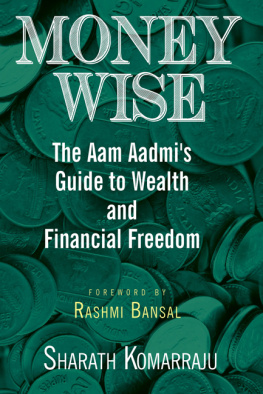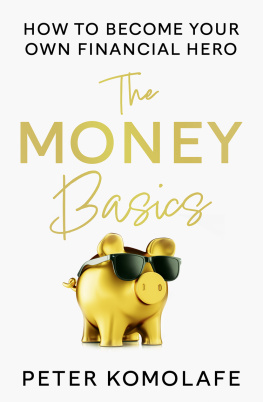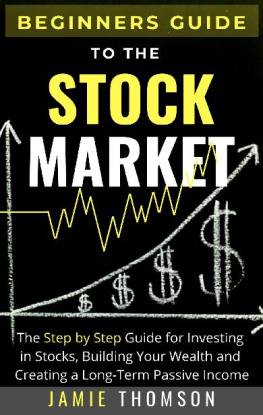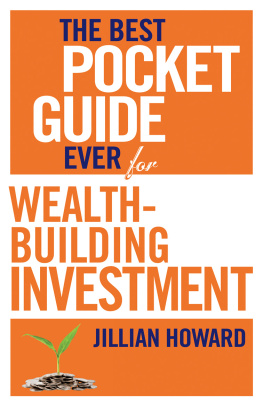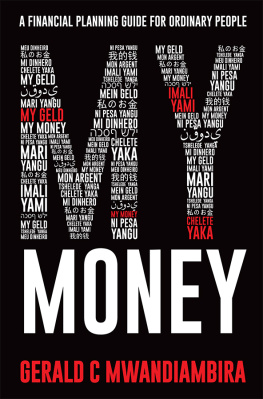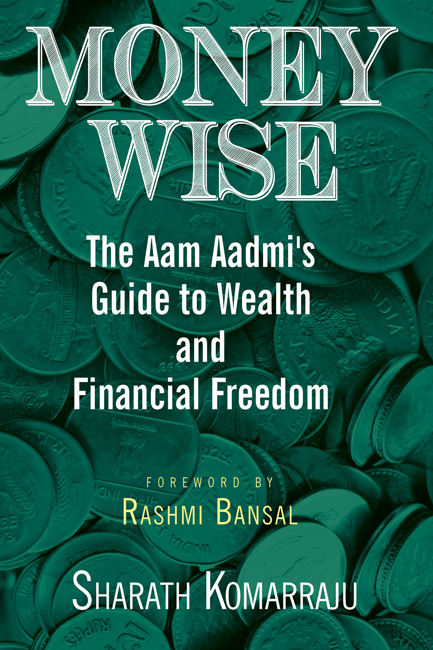
Also by Sharath Komarraju
Murder in Amaravati, 2012
Banquet on the Dead, 2012
The Winds of Hastinapur, 2013
The Puppeteers of Palem, 2014
Have you checked out the thriving community of readers and writers at sharathkomarraju.com ? You will find contests, giveaways, discussions and other fun things happening there every single day. Come and say hello. We dont bite!
To the rupee note, who has made
marathon runners of us all
Contents
Money, money, money
Always sunny
In the rich mans world
Aha-ahaa
All the things I could do
If I had a little money
Its a rich mans world
ABBA
I bet you fully and completely identify with the lyrics of this iconic pop song. Whether in Sweden or in Sewri, the fact is that the vast majority of humanity never has enough money.
Money makes the world go round. It makes us happy, sad, grateful, vengeful. But is it money which is to blame, or is it our attitude to money?
Although modern society gives so much importance to money, we are never formally taught how to handle it. How to invest it. How to use it wisely. Thats why this book is important. It will help you see money in a new light. Like Newtons laws of physics, there are principles that govern spending, saving and investment. These principles are explained by author Sharath Komarraju in clear and simple language.
Because he is not a jargon-heavy finance expert, but a layman like you.
I would advise you to not just read this book but apply what you learn here in your day-to-day life. Soon you will have a little money and find that money is not your enemy, but your friend.
Rashmi Bansal
February 2015
A Taboo Bigger Than Sex
DURING THE ENGINEERING or medicine conversation I had with my parents when I was fifteen, my mother had her feet plonked deep into the medicine side, whereas my father (a doctor) rooted for engineering. While Moms argument was full of what we would call intangibles, Dad warned me not to get swayed by the romance and the roses. A doctors life was thankless, he said, and it was likely to get more so as the years went by. A doctor had to constantly think about where his next cheque was going to come from, whereas an engineer could delegate all money concerns to his company and live life instead.
Were not very good at earning money, he told me, the we referring to the family. And before you say money is not important, let me tell you that by the time you grow up, money will become the only important thing.
Conversations of this type were certainly the exception in my family, not the norm. Much is made of the reluctance in our households to speak about sex, but there is a bigger aversion to money, I think. I have an excellent relationship with my parents and my wife; we speak freely with each other on art, culture, politics, sometimes sex too, but when it comes to money, a certain tightness takes over, the air becomes heavier, and we fumble for words.
Yet no one denies its importance. How many of us have not seen families wrenched apart over property division? One of our oldest and grandest stories, the Mahabharata, is a tale of brothers fighting over their rightful claim to wealth and property. Popular culture and in India that means Bollywood has always extolled the virtues of money. We all desire it, contemplate on how to increase it, fear losing it, and yet we dont venture to talk about it with the people who matter most to us.
We do talk about it, though, to neighbours, colleagues and friends. How many people did your father call when you got your first job? How many times does your mother slip the subject of your salary into conversations at social gatherings? At many big offices, it is not uncommon for people to sit in a circle and compare bonuses and promotion packages. But if our parents at home asked the same question, we either wave them away in irritation, or we lie, generally rounding up to the next lakh.
In marriage, too, salary plays a major role. I found myself in an arranged marriage setting a few years back. The girls side of the family sat along one edge of the room, and we sat on the other. Snacks and water had already been served. While all of us were trying our best to think of things to say while smiling awkwardly, the elder brother of the girl piped up and asked me, Where do you work? I told him. His next question was, What is your salary? I looked around the room and realized that none of the people present thought it to be an inappropriate question. They seemed quite eager to hear what I had to say.
In my answer, of course, I rounded up to the next lakh.
So there is a queer little dynamic here, dont you think? On the one hand, we acknowledge to the whole world that money is essential, and in all practical situations we admit its seminal importance. Yet in our families, within our most intimate relationships, there is hardly a mention of it. Could it be that as much as money gives us status among our peers, we acknowledge, deep down, that it could also undress us, make us vulnerable, and somehow shame us?
There is no doubt that money is at the root of most family discords. For those of us who have not known our grandmothers, a common saying among them goes something like this:
Money, money, what have you done?
Youve split up a family that lived as one.
Between husband and wife, too, money wedges itself and wags its tongue. The number one cause of all marital discord, across all cultures all over the world, is not sex or love or romance or empathy but money.
In 1992, the National Survey of Families and Households in the United States of America asked 2800 couples across the country to rank all the common reasons for domestic dispute in the order of how often they occur and how deeply they affect their relationships. Of all the common items on the list chores, in-laws, spending time together, sex and money money came out at number one.
A more recent example: in 2012, a study titled Examining the Relationship between Financial Issues and Divorce was published in the journal Family Relations (vol. 61). It looked at longitudinal data from over 4500 couples across North America, and concluded that the top predictor of divorce was not children or sex, but money.
Yes, the studies belong to the United States, so the actual numbers in India if and when such research becomes common will be different. But considering the wide prevalence of arranged marriages here, it will not be incorrect to assume that money features as number one on the agenda in marital unions across the country.
Think of your own marriage, of your relationships with your parents and siblings. How many of them have that undercurrent of discomfort? Does your younger brother earn more than you do? Has your father left more wealth to your sister than he did to you? Does your cousins son earn more than your son, and do you dread the moment when she will corner you and demand a comparison of salaries? How many times in our adult lives do we wish we could go back to the innocent times of our childhood when we could play and fight and love without a thought given to things such as status and money?
Perhaps the first step we all ought to take, if that has to happen, is to look inward and ask what money means to us. The key here is to stay unflinching when faced with contradictions. You may remember the rich uncle who scrimps on every penny and proclaims to the world that Money doesnt buy you happiness. Were all a mess of contradictions like that, and were all trying to balance our greed with our generosity, our envy with our humility, our anger with our calm. So as you make a list of emotions that money invokes in you, you may find that strange combinations appear, like fear and pleasure, the need for acceptance and the need to stand out from the crowd. That is perfectly natural.
Next page
